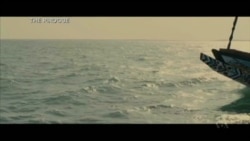Films from the length and breadth of Africa, Algeria to South Africa - and many other corners of the world -- are screening at this year’s African Diaspora International Film Festival in New York. It’s the 22nd year for the Festival, founded in 1993 by Reinaldo Barroso-Spech, who is of Jamaican-Haitian descent, and his French-Malian wife, Diarah N’Daw-Spech.
The films include feature-length fiction and documentaries, as well as shorts and animations. The one thing they have in common is that all concern people of color. There are documentaries exploring the African roots of Argentine tango, the life of President Obama’s white mother, Stanley Ann Dunham, and the Garifuna people of Honduras.
Karin Junger’s Sexy Money, about Nigerian prostitutes living illegally in Europe is a “musical documentary,” with songs by Nigerian singer Nneka underlining the beauty in the struggles of two women reclaiming their lives after being deported home.
“If they arrest you, you won’t say a word to the police. You won’t tell who brought you to Europe. You won’t tell them where you live. You won't give them any information,” one woman says in a scene from the movie.
Fiction films include several recent award-winners, such as 2012’s The Pirogue, by Senegal-born director Moussa Touré, about a group of African men and one woman who risk the dangerous journey to Spain in a fishing boat. Elza, a 2011 feature film by Mariette Monpierre, Guadeloupe’s first female director, tells the story of a young woman raised in France who returns to her native Caribbean to search for her father. An “epic” biographical film, Njinga, Queen of Angola, dramatizes the 16th century ruler who led her people in a struggle for freedom from Portuguese usurpers.
Supremacy, the opening night film, features American actor Danny Glover in a drama about white supremacists who take an African-American family hostage. Rengaine, a 2012 French film by Rachid Djaidani, is being shown as part of a themed series on race issues in France. It’s the story of an Algerian Muslim woman in Paris whose plan to marry a black African, a Christian, is opposed by her eldest brother, who attempts to enlist his 39 younger brothers to stop the wedding.
Expanding options for African film
The festival holds screenings at venues around Manhattan, including the famed Riverside Church, a one-time center for anti-apartheid activism, where Nelson Mandela spoke after his release from prison. Colleen Birchett, a college writing professor, is among the church’s African Fellowship members who volunteer for the Festival.
“They represent African filmmakers, and African filmmakers have such a difficult time getting what we call their counter-narratives, their perspectives into the mainstream media, so that their voices are heard,” she said, “There’s been a whole history of stereotyping of Africans, and telling very narrow slices of the truth.”
Filmmaking by black Africans was discouraged, even illegal in some countries, before independence. “During the colonial period, film was used mainly in a political sense, and also to point out the atrocities of apartheid,” said Temple University professor Molefi Kete Asante, who spoke at the festival’s celebration of 20 years of democracy in South Africa. “So in South Africa, the films that I grew up on, were films that made you want to do something about the condition in the country,” he said.
One of those screened at the festival, Come Back, Africa, made by American director Lionel Rogosin in 1959, is a drama about black South Africans living under apartheid. It won the critics award at the Venice Film Festival, and was banned by the South African government.
Mmabatho Ramagoshi, chair of the National Film and Video Foundation introduced several young South African filmmakers at the democracy celebration, including 25-year-old Lwazi Mvusi, whose 24-minute film The State screened at the festival.
“It’s a sci-fi, it’s projecting 20 years into South Africa’s future, and it’s basically a dystopian world, where the population’s been separated into supporters of the state and detractors of the state,” Mzusi said. She said she is concerned that “Africa does have this trend of 20, 30 years into their democracies becoming dictatorships, and anyone who is supporting the government or president who has been sitting there for 20 years, they have it better than those who detract. And are we moving down that same line?” she asked.
New stories
The centerpiece film of the South African celebration, Between Friends, was billed as the first-ever romantic comedy from the country, and its polished cinematography and familiar story, about a group of affluent young professionals on a holiday, might have come out of Hollywood. Director Zuko Nodata said in fact, that he was influenced by the comic films of American director Tyler Perry.
“Why not tell a story that the people love, that people will go and see?” he asked. “I think it was about time that people wanted to watch a film that they would feel good afterwards,” he continued. “We realized we do have good stories to tell now in our country, as opposed to black people that are always seen as struggling. People in South Africa these days can take a holiday, can go on honeymoons. So, this was one of those stories we decided to tell, to show we as a country have really moved on,” he said.
Mvusi said she was sure that film was a force in liberation. “I think as much as you talk politics, when you tell people stories, they understand - they understand characters, they understand the things that other people go through,” she said. “Not just in South Africa, but across the continent.”





